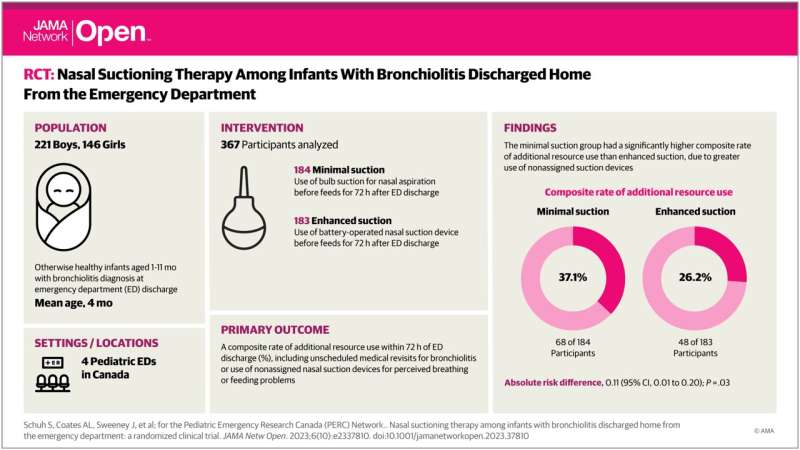November 8, 2023 report
This article has been reviewed according to Science X's editorial process and policies. Editors have highlighted the following attributes while ensuring the content's credibility:
fact-checked
peer-reviewed publication
trusted source
proofread
Nasal suctioning method for infants with bronchiolitis found to affect parental satisfaction more than disease outcomes

Researchers led by the University of Toronto, Canada, have conducted a randomized clinical trial to evaluate the effectiveness of enhanced vs. minimal nasal suctioning in treating infants with bronchiolitis after discharge from the emergency department.
In their paper, "Nasal Suctioning Therapy Among Infants With Bronchiolitis Discharged Home From the Emergency Department," published in JAMA Network Open, the team found that enhanced suctioning did not significantly impact the course of bronchiolitis compared to minimal suctioning.
The study included otherwise healthy infants aged 1 to 11 months (median age 4 months) diagnosed with bronchiolitis. Bronchiolitis was defined as the first episode of upper respiratory infection with nasal congestion and respiratory distress.
Participants were randomly assigned to one of two groups with either minimal suctioning via a bulb pipetting device or enhanced suctioning via a battery-operated device.
The primary outcome was additional resource use, which was a composite of unscheduled revisits for bronchiolitis or the use of additional suctioning devices for feeding or breathing concerns.
Enhanced suctioning did not significantly alter the disease course compared to minimal suctioning. While there was a slight reduction in additional resource use with enhanced suctioning, it was not statistically significant. There was no significant difference in unscheduled revisits for bronchiolitis between the two groups, indicating that enhanced suctioning did not lead to fewer revisits.
Minimal suctioning resulted in significantly higher use of non-assigned suctioning devices for perceived breathing or feeding difficulties compared to enhanced suctioning, suggesting that parents in the enhanced suction group were more satisfied with their assigned device than those in the minimal suction group.
The satisfaction or confidence in the suctioning method was unrelated to various secondary outcomes, including bronchiolitis revisits, emergency department revisits, changes in normal feeding and sleeping. While no significant differences were observed in primary or secondary outcomes, parental care satisfaction was higher in the enhanced device group.
Bronchiolitis is a leading cause of infant hospitalizations and is associated with significant health care resource utilization. Effective therapies are limited, leading to substantial practice variation and the potential for unwarranted treatments. Nasal suctioning is commonly used to relieve nasal congestion in infants with bronchiolitis, yet the efficacy of different suctioning methods has been unclear.
The current study illustrates that when an enhanced suctioning device was used, it did not alter the disease course compared with minimal suctioning, but that assigning minimal suctioning did lead to a significantly higher use of non-assigned suctioning devices and a lower parental satisfaction with the assigned device. The authors suggest that minimal suctioning may be sufficient for managing bronchiolitis in infants and highlight the importance of parental satisfaction with perceived differences in treatment options.
More information: Suzanne Schuh et al, Nasal Suctioning Therapy Among Infants With Bronchiolitis Discharged Home From the Emergency Department, JAMA Network Open (2023). DOI: 10.1001/jamanetworkopen.2023.37810
© 2023 Science X Network


















